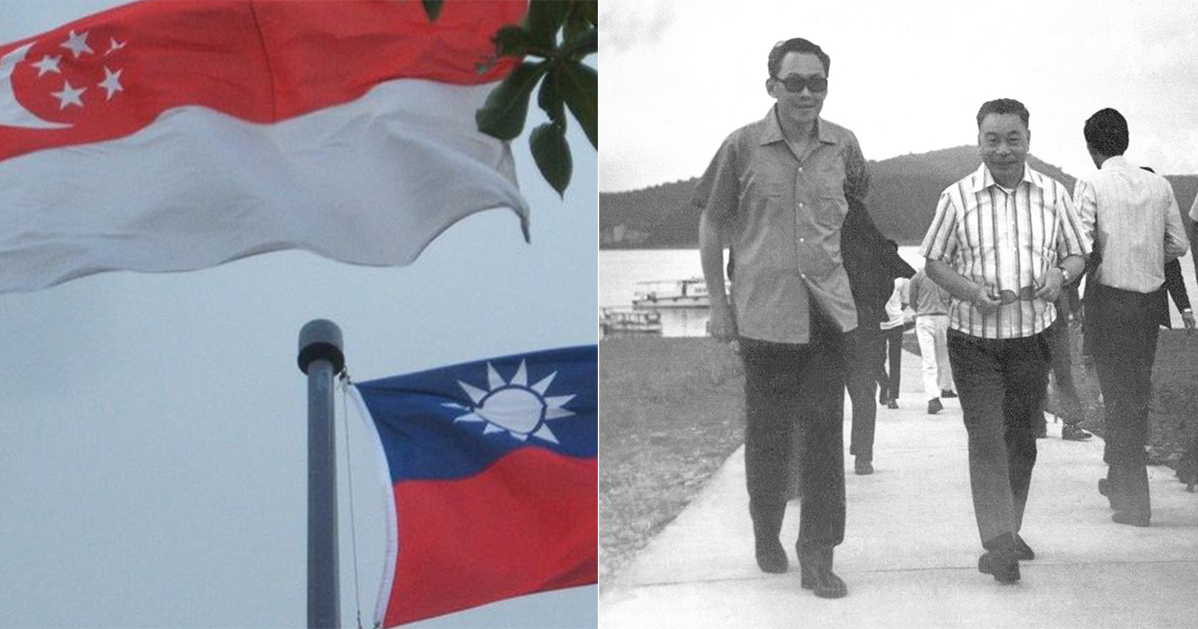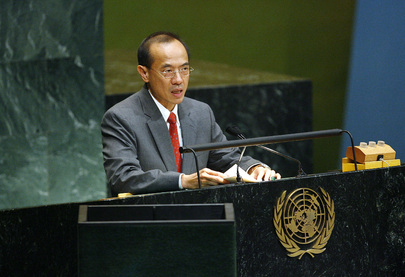Out of Taiwan's remaining 18 diplomatic allies, Singapore is not officially one of them.
In spite of this, Singapore has extensive ties with Taiwan.
A little background
The exchange of trade missions occurred as far back as 1969, while the signing of "Exercise Starlight" -- the agreement that allows Singapore to train our infantry, artillery, armour and commando units in Taiwan -- occurred in 1975.
As a point of contrast, the late Lee Kuan Yew's first visit to China was in 1976, with formal relations only established in 1990.
What's more, even though Singapore also has defence ties with China, we have never gone to the extent of training in China, even when the Chinese offered to let the Singapore Armed Forces use Hainan Island.
So, how did such a lasting bond between Singapore and Taiwan come to be?
Taiwan helped Singapore's military
This might have a lot to do with the moment that Taiwan decided to make contact with Singapore: a mere two years after Singapore's independence, when building up our military was of utmost importance.
In 1967, as Lee recounted in his memoirs, From Third World to First, the Singapore government found itself confronted with a pressing need for the military and a lack of space to build up an air force.
The Israelis did not have the facilities to meet such a need, and in any case, Lee was keen that Singapore did not end up completely dependent on the Israelis for military training either.
Cue the entry of Taiwan.
That same year, Taiwan sent a top-level representative to Singapore to meet with Lee and then defence minister Goh Keng Swee.
Their objective then was to find allies amidst their isolation exerted by China.
Given that Singapore was the only country in the world to also share racial, cultural and language links with Taiwan apart from China, we were a natural choice.
The timing could not have been more salubrious.
By the end of 1967, Taiwan had submitted a proposal to Singapore on building up an airforce, sowing the seeds of Lee's friendship with Taiwanese Premier Chiang Ching-kuo, and the eventual realisation of "Exercise Starlight" in 1975.
LKY's personal touch in building relations
The fact that Lee built up great rapport with Chiang also helped extensively in laying the foundation for solid relations.
As Lee further recounted in his memoirs, he had "good personal chemistry" with Chiang, and the basis of their relationship "was that we were both against communism".
Lee also noted that when Lee Wei Ling accompanied him for his initial visit in 1973, she left a strong positive impression on Chiang with her Chinese-educated background.
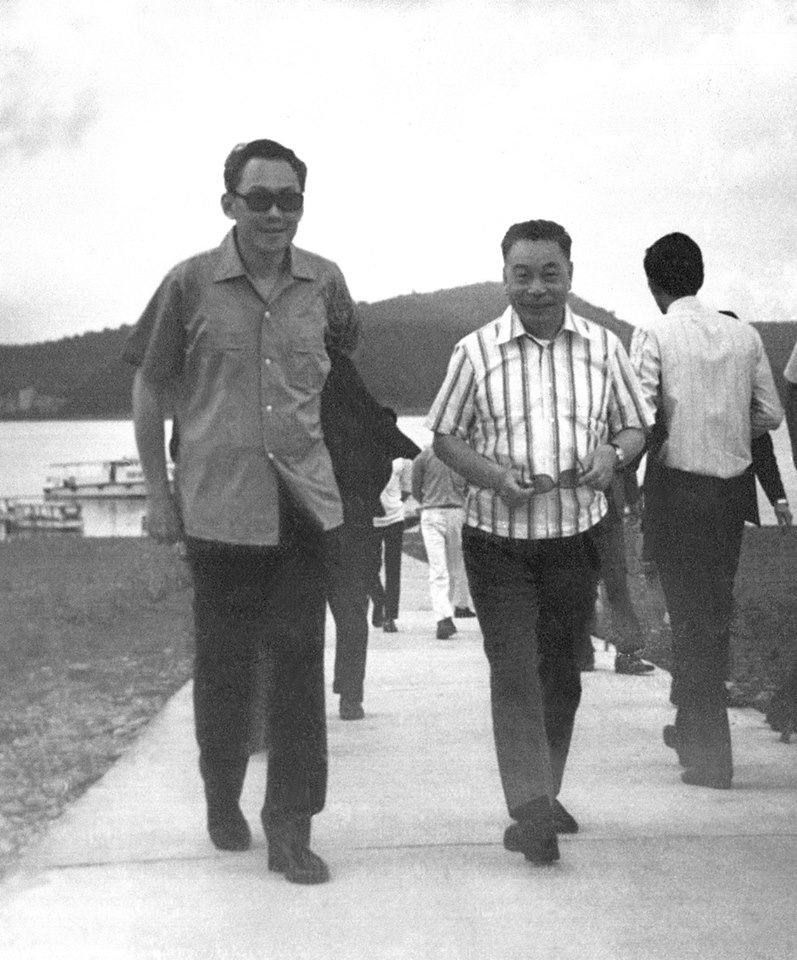 Lee Kuan Yew and Chiang Ching-kuo. Source: My Paper 我报 Facebook
Lee Kuan Yew and Chiang Ching-kuo. Source: My Paper 我报 Facebook
[related_story]
Chiang also found Lee to be a valuable source of information on geopolitical developments in America and the wider world as he was unable to travel freely.
As a result of the friendship that Lee developed with Chiang during his visits in 1973 and 1974, the latter came to be sympathetic to the constraints faced by Singapore.
This resulted in the signing of "Exercise Starlight" in 1975.
Lee would also make an effort to visit Taiwan at least once or twice a year from 1973 to 1990 to witness Taiwan's rapid development as one of the "Four Asian Tiger" economies.
Fortunately, such rapport was not just limited to Chiang. Lee also got along well with former Taiwanese President Ma Ying-jeou during his tenure starting from 2008 until 2015 when Lee passed away.
Lee praised Ma's policy of "no unification, no independence, and no use of force" as it promoted peace between China and Taiwan and improved relations between the two sides.
For Ma's part, he was sufficiently close with Lee, so much so that during Lee's passing, Ma made a personal trip to Singapore at the behest of current Prime Minister Lee Hsien Loong to attend the private family wake.
Sensitivities surrounding the issue of China and Taiwan dictated that he could not attend the state funeral where the Chinese delegation would be present.
This did not go unnoticed by The Economist, which dubbed it as a "diplomatic coup" for Taiwan.
Handling China's eye on the relationship
Of course, Lee was already mindful as far back as 1967 that Taiwan's status as a state was tricky to deal with and he decided recognition of Taiwan as a state was something that could not be agreed to.
As such, he opted for an approach that more or less struck middle ground: There was only "one China" and the issue of reunification was an internal matter between the People's Republic of China and Taiwan to sort out. This is a stance that Singapore has always emphasised since then.
For a while, everything seemed good.
Initially, in 1990, when formal relations with China was established, little was made of the training arrangement.
Then Chinese Premier Li Peng stated that China would not be "too disturbed" if the arrangement continued.
Li even added that, "We sympathise with Singapore's position and understand its need to build a strong defence force. On this matter, suitable arrangements will be made."
Moreover, it was this stance that even resulted in Singapore being selected as the venue for the 1993 Wang-Koo summit, the first high-level meeting to ever occur between China and Taiwan, and the subsequent Xi-Ma summit in 2015, between Chinese President Xi Jinping and Ma.
Singapore was perceived to be neutral by both sides.
Minute-long handshake marks historic meeting between Xi Jinping and Ma Ying-jeou #XiMa https://t.co/ewm2qcKiob pic.twitter.com/aM17xBFLo2
— The Straits Times (@STcom) November 7, 2015
However, in November 2016, China's tone showed a marked change, during the infamous Terrex incident when nine SAF Terrex Infantry Carrier Vehicles (ICVs) were detained in Hong Kong while en route from Kaohsiung.
China's propaganda mouthpiece Global Times published a bellicose piece on the incident, stating that,"after 1990... it is no longer reasonable for Singapore to continue Project Starlight or any kind of military exchanges with Taiwan." It also accused Singapore of "hypocrisy".
Adding on to the hostile tone was the lodging of a diplomatic protest by China's foreign ministry to Singapore.
Although the nine Terrex ICVs eventually returned to Singapore in January 2017, the message sent by China was clear: It was displeased with the close military ties between Singapore and Taiwan.
[caption id="" align="alignnone" width="681"]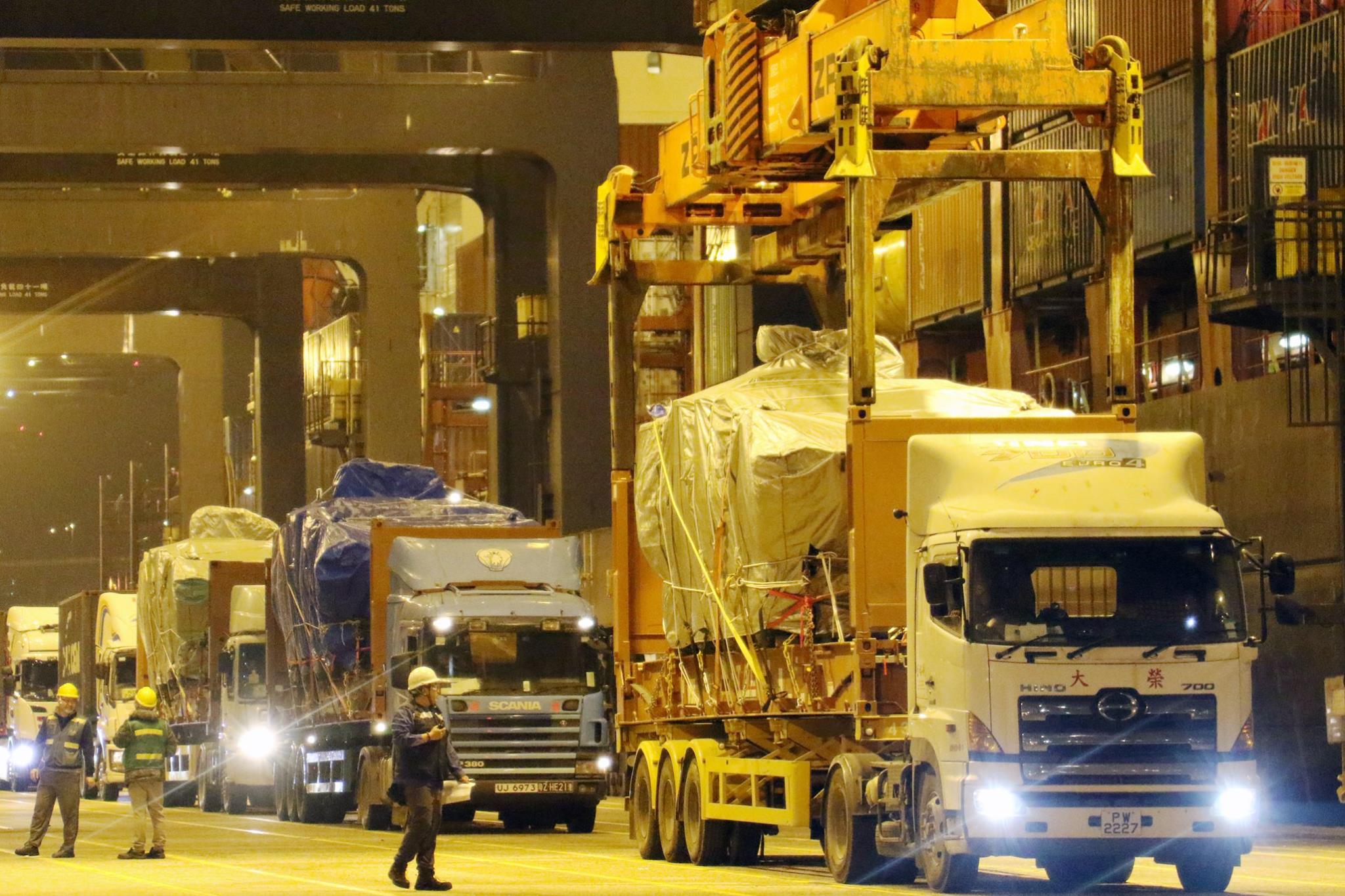 Source: Ng Eng Hen Facebook[/caption]
Source: Ng Eng Hen Facebook[/caption]
However, it had no effect in changing Singapore's stance, given that Taiwan was one of only two countries at our time of independence to offer help in training up our military. It is not in Singapore's interest to give up on the agreement simply because of pressure by Beijing.
Additionally, as the South China Morning Post reported, since Singapore already respected China's "One China" policy, it expected China to do the same for Singapore's sovereign right to conduct military training wherever it deemed appropriate.
Differences and disputes with Taiwan
Of course, as unshakable as the ties between Singapore and Taiwan have been so far, there has been moments where things took a turn for the worst.
Lee's relationship with the Taiwanese presidents between Chiang and Ma were not as smooth.
With Chiang's successor, President Lee Teng-hui, Lee Kuan Yew found that although they got along well, a number of differences in their governing styles ensured that the relationship between Singapore and Taiwan would no longer be on the same level as in the days of Chiang.
Notably, Lee Teng-hui was critical of Lee Kuan Yew's "Asian values", which he perceived as dynastic and overseer of a political system where “a whole family meddles in politics”.
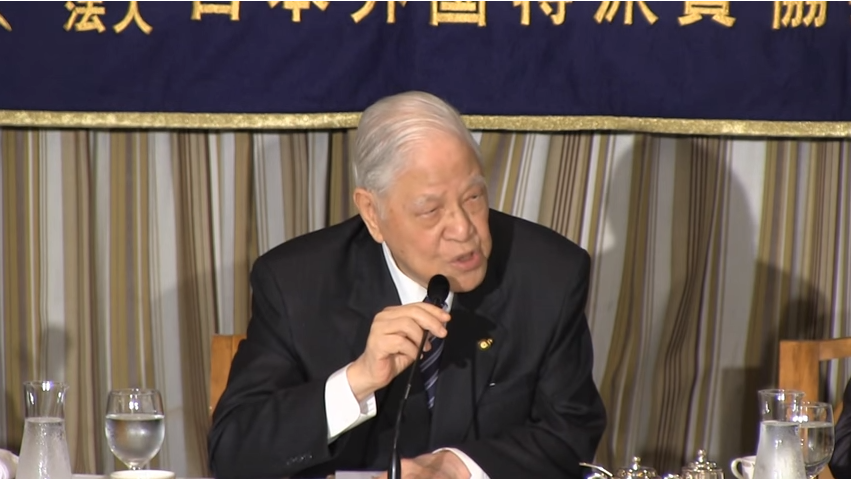 Lee Teng-hui speaking in Japanese on Taiwanese autonomy. Source: Screegrab from Youtube via FCCJchannel
Lee Teng-hui speaking in Japanese on Taiwanese autonomy. Source: Screegrab from Youtube via FCCJchannel
Lee Kuan Yew on the other hand saw Lee Teng-Hui's opening up of the political system as an act that led to greater corruption in the government, as it allowed the triads, which had hitherto been controlled by Chiang's government, to gain power.
The Singaporean Lee specifically noted in his memoirs that a free press could do nothing to stop them.
The Taiwanese Lee was also much more vocal in his push for independence, at one point comparing himself to Moses leading his people out of Egypt.
For the Singaporean Lee, it was an unhelpful stance as he felt that Taiwanese Lee's only achievement out of it was to turn Taiwan from one of China's dozen problems into China's overriding problem.
These differences spilled over into Lee's relationship with Chen Shui-bian, when he succeeded Lee Teng-hui.
Lee's visit to meet Chen was marred by protests from the Taiwanese Independence party with accusations that he was a "broker to betray Taiwan" and "China's puppet." Lee Teng-hui also dismissed Lee's visit as of "no help at all".
2004 speech by ex-Foreign Minister George Yeo to the UN
The lowest point of Singapore-Taiwan relations occurred in 2004, when Taiwan reacted very badly to a speech by then Singapore Foreign Minister George Yeo to the 59th Session of the United Nations General Assembly in New York on Sept. 24, 2004.
In his speech, Yeo mentioned:
"The push towards independence by certain groups in Taiwan is most dangerous because it will lead to war with mainland China and drag in other countries. At stake is the stability of the entire Asia-Pacific region."
This prompted then Taiwanese Minister of Foreign Affairs Mark Chen to furiously retort, "Singapore holds China's l*n p*(卵葩) with its hands, if I may use these ugly words," and that "Singapore is a country only as big as a piece of snot."
He added that while China's pressure influenced Singapore to make the speech, "Yeo's remarks went too far".
Chen further bemoaned that there was a lack of justice given that then Deputy Prime Minister Lee Hsien Loong was treated well when he visited Taiwan in July 2004.
Yeo's remarks also saw a group of demonstrators gather in Kaohsiung to burn the Singapore flag amidst chants of "Singapore is an informer".
Still holding strong
In any case, Mark Chen's remarks, while arresting, did not result in any substantial damage to ties between Singapore and Taiwan and as mentioned above, ties improved under President Ma.
A free trade agreement (FTA) was even signed between both sides in 2013, making Singapore one of only two countries to have an FTA with Taiwan.
The other country is New Zealand.
If the past episodes are therefore any indicator, it is very likely that our ties with Taiwan will keep holding in the years to come, even with the latest protest by Taiwan over the decision by Singapore Airlines and Scoot to name the island as part of China on their websites.
Featured image from Jed Mitter Flickr
If you like what you read, follow us on Facebook, Instagram, Twitter and Telegram to get the latest updates.
